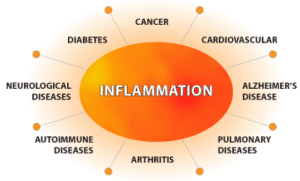Inflammation in the body causes or contributes to many debilitating, chronic illnesses. These include osteoarthritis, rheumatoid arthritis, heart disease, Alzheimer’s disease, Parkinson’s disease and cancer.
Eating a diet focused on anti-inflammatory principles not only helps protect against certain diseases, but also slows the aging process by stabilizing blood sugar and increasing metabolism. Many people find they also lose w eight by following an anti-inflammatory eating pattern. Eating for long-term health by lowering inflammation is the key to reducing many health issues.
eight by following an anti-inflammatory eating pattern. Eating for long-term health by lowering inflammation is the key to reducing many health issues.
Incorporate these principles into your diet for optimal health:
Consume at least 25 grams of fiber every day.
A fiber-rich diet helps reduce inflammation by supplying naturally occurring anti-inflammatory phytonutrients found in fruits, vegetables, and other whole foods. Seek out whole grains, fruits and vegetables to get your fill of fiber. Best sources include whole grains such as barley and oatmeal; vegetables like okra, eggplant, and onions; and a variety of fruits like bananas and blueberries.
Eat a minimum of nine servings of fruits and vegetables every day
One serving is half a cup of cooked fruit or vegetable, or one cup of raw leafy vegetables. Add anti-inflammatory herbs such as turmeric and ginger to your cooked fruits and vegetables to increase their antioxidant capacity.
Eat four servings of both alliums and crucifers every week.
Alliums include garlic, scallions, onions and leek. Crucifers refer to vegetables such as broccoli, cabbage, cauliflower, mustard greens and Brussels sprouts.
Because of their powerful antioxidant properties, consuming a weekly average of four servings of each can help lower your risk of cancer. If you can tolerate the taste, eat a clove of garlic a day!
Limit saturated fat to 10 percent of your daily calories.
By keeping saturated fat low (20 grams per 2,000 calories), you will help reduce the risk of heart disease.
You should also limit red meat to once per week and marinate it with herbs, spices and tart, unsweetened fruit juices to reduce the toxic compounds formed during cooking.
Consume foods rich in omega-3 fatty acids.
Research shows that omega-3 fatty acids reduce inflammation and may help lower risk of chronic diseases such as heart disease, cancer and arthritis – conditions that often have a high inflammation process at their root.
Aim to eat lots of foods high in omega-fatty acids like flax meal, walnuts, beans such as navy and kidney. Taking a good quality omega-3 supplement is helpful also.
Consume cold-water fish such as salmon, oysters, herring, mackerel, trout, sardines and anchovies.
Eat fish at least three times a week.
Choose both low-fat fish such as sole and flounder, and cold-water fish that contains healthy fats like the ones mentioned above.
Use oils that contain health fats.
The body requires fat – choose the fats that provide you with benefits. Virgin and extra-virgin olive oil (organic if possible) and coconut oil are good.
Avoid processed foods and refined sugars.
This includes any food that contains high-fructose corny syrup or is high in sodium which will contribute to inflammation throughout the body.
Avoid refined sugars whenever possible and artificial sweeteners altogether. The dangers of excess fructose have been widely cited and include increased insulin resistance, raised uric acid levels, raised blood pressure, increased risk of fatty liver disease and more.
Cut out trans fats.
Studies show that those who eat foods high in trans fats have higher levels of C-reactive protein, a biomarker for inflammation in the body. Always read labels and steer clear of products that contain the words “hydrogenated” or partially hydrogenated oils”. Vegetable shortenings, select margarines, crackers, and cookies are a few foods that might contain trans fats.
Sweeten meals with phytonutrient-rich fruits, and flavor with spices.
Most fruits and vegetables are loaded with important phytonutrients. In order to naturally sweeten your meals, try adding apples, apricots, berries and even carrots.
For flavoring meals, go for spices that are know for their anti-inflammatory properties including cloves, cinnamon, turmeric, rosemary, ginger, sage and thyme.
For more help with how master foods for fertility, gut health, blood sugar stabilization and overall health and well-being give us a shout. We will be happy to have a consult with you and come up with a plan. ![]() for a complimentary consult!
for a complimentary consult!
Next up – The Immune System and Inflammation





